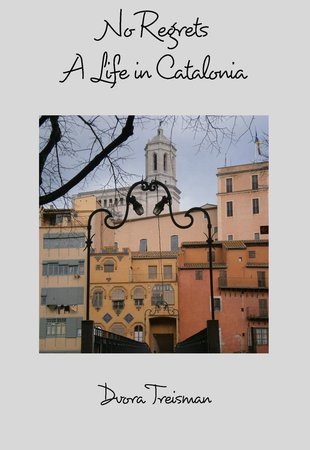Beating the odds
’No Regrets. A Life in Catalonia’ is an account of Dvora Treisman’s move from the US to Barcelona, her relationship with her Catalan husband, the practical obstacles she had to overcome, and her final move to Figueres
setbacks notwithstanding, the author feels instantly at home in Barcelona and in Catalonia as a whole
The book is an entertaining if sometimes melancholy memoir about her life in Catalonia
At the not so tender age of 52, Dvora Treisman moved to Catalonia from her native California in 1999 because she and her Barcelona-born husband Manuel, who she had met in the US, were curious to see his hometown. Manuel had lived there when Spain was being run by a Fascist dictatorship (which had virtually banned his mother tongue). The post-Olympic Barcelona he discovered was a much more attractive city than the one he remembered from his childhood, and his wife – a first-time visitor - found it captivating. They decided to move there. This book is an account of their relationship, the many practical obstacles Treisman had to overcome, and her final, solitary move to Figueres, where she still lives.
Autobiography is a notoriously difficult genre, whose authors often slide into rampant egocentrism or report details that may have mattered very much to them at some point but are of no interest whatsoever to anyone else. Happily, Dvora Treisman has avoided such pitfalls and has produced an entertaining if sometimes melancholy memoir about her life in Catalonia, full of episodes which might appear trivial at first but in fact deftly push the narrative forward so that the reader is, more often then not, left wanting to find out what happens next.
There is, for instance, an endless tug of war to get a phone installed, Telefonica still being the merciless, overpriced monopoly that many of us remember only too well; pieces of furniture have to have their legs removed so they can get through the doors of their small flat in the Barri Gòtic; a variety of local drunks and eccentrics make a horrendous racket in the street until the neighbours pour buckets of water over them. And then there are more serious difficulties: the nightmare of getting a residence permit; the first, tough attempts to learn Catalan (Treisman opts for this over Spanish, not wanting her husband’s friends and family to change their language just for her); and the discovery, gradual but inexorable, that her marriage has not been made in heaven.
Such setbacks notwithstanding, the author feels instantly at home in Barcelona and indeed in Catalonia as a whole. Her descriptions of the Palau de la Música, Sant Jordi’s Day, the human towers, the correfoc, and her first Diada (’like our Fourth of July but without the independence’) put us firmly and refreshingly in the shoes of a foreigner who is seeing these things for the very first time. Here and there Treisman also scatters interesting and informative smatterings of Catalan history and culture around the text. And towards the end of the book, she offers a concise and precise summary of the significance of the 2012-2017 pro-independence demonstrations (she tellingly compares the annual participation of between one and two million Catalans out of a total population of seven and a half million, with the 470,000 strong Women’s March on Washington in 2017, one of the largest in the history of the United States, whose population is over 44 times greater than that of Catalonia).
There are very few books in which a few nits cannot be picked, and this particular volume could have done with more careful proof-reading in order to eliminate the occasional unintentional repetition of data as well as the incorrect spelling (and accenting) of some of the Catalan words and names. These infrequent slips, however, do not spoil this description of a personal adventure that has lasted over 20 years and which manages to be both fascinating and poignant.
book review
Embracing a new culture
Dvora Treisman was born in Sosua, Dominican Republic. Her father was an agronomist and at the first opportunity her family left Sosua to live in the US . She grew up in Los Angeles. In 1971 she moved to Berkeley with her first husband. After some years, they divorced.
In 1999, at the age of 52, she went to live in Barcelona with her new, Catalan husband whom she had met salsa dancing. They lived in Barcelona for two years, then in Tarragona for two years, and while living in L’Ametlla de Mar they got divorced and in 2012 Treisman moved to Figueres. She has lived in Figueres for 11 years and in Catalonia for more than 22.
She decided to learn Catalan so that her husband’s family wouldn’t have to change language to accommodate her, and because it is the native language and she wanted to integrate.
For bureaucratic reasons, in her first few years here she had no visa, no work permit and little money. None of that prevented her from learning about the culture, seeing much of the territory, and joining the independence movement.




